A career in STEM is not limited to one gender alone
For the International Women’s Day, La Fondation Dassault Systèmes gives a voice to committed, inspiring and hard-working women.
Dr. Mona Eskandari
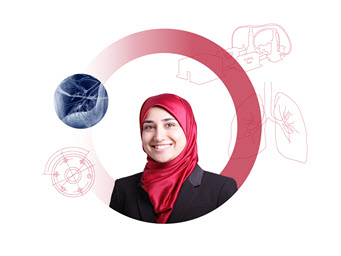
Representation is important and can be inspirational to so many to realize that their goals are achievable.
Mona Eskandari is a mechanical engineering professor, affiliated faculty of the BREATHE Center in the School of Medicine at the University of California Riverside. Her PhD and postdoctoral fellowships were at Stanford University and the University of California Berkeley, respectively. Her research expertise is in pulmonary biomechanics, an area of rapidly growing interest given the COVID-19 global pandemic.
Mona’s lab investigates fundamental lung mechanics through an engineering lens, seeking solutions to medical questions surrounding pulmonary disease. Through experimental characterization and computational modeling, they aim to develop predictive technologies, enhance diagnostic capabilities, and optimize clinical interventions. The project supported by La Fondation Dassault Systèmes accelerated these objectives by directly addressing the respiratory physiology of the pandemic. Mona and her team are now one step closer to providing evidence-based clinical strategies to mitigate ventilator induced lung injuries and improve outcomes for coronavirus patients.
“We do not know where the next big idea for humanity will come from – the cure for cancer or paradigm shifting technological leap can originate from anywhere,” states Dr. Eskandari. Therefore, from where she stands, bringing as many diverse minds as possible to the discussion by ensuring the inclusivity of women and other underrepresented groups is crucial to fostering new scientific discoveries.
“Representation is important and can be inspirational to so many to realize that their goals are achievable. There may be roads that are less traveled and in need of bold pioneers to pave that path; we must mentor, support and even dare to be the first. Personally, I am excited to have the opportunity to educate the next generation of engineers and inventors who will make the world a better place for us all,” she concludes.
Dr. Morgane Le Bras
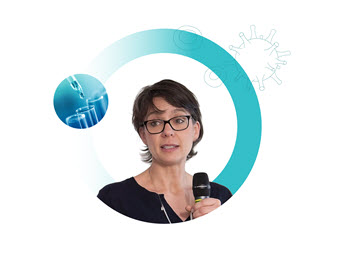
Enjoy onboarding on solving complex science issues!
Morgane Le Bras is a biologist and senior lecturer at the Medical School of the Paris University. She leads research activities at the Saint Louis hospital, also in Paris, which are focused on molecular mechanisms accounting for the initiation of carcinogenesis, as well as for responses to treatments.
With her teaching and laboratory experiences, Morgane is involved in scientific knowledge transmission to the general public, through a non-profit organization of researchers called l'Arbre des Connaissances. Together with this group of committed professional volunteers, she participates in the development of the “Apprentis Chercheurs” program in research laboratories all over France, including those of Dassault Systèmes.
“Apprentis Chercheurs" allows sets of two or three middle and high school students to participate in a laboratory’s research work throughout the year. Thanks to adapted tutoring, these young people carry out a project and present their results to close the year during a conference specifically organized in or by the research institute that has opened its doors to them.
La Fondation Dassault Systèmes supported this ambitious program, and welcomed many young women and girls to research facilities where the important role of women is often overlooked. As Morgane notes: "Starting with students' questions and being able to have them think together, this highlights the importance of teamwork. This is an important collaborative approach, in which women feel comfortable and are effective.”
Encouraging reflection about scientific issues and putting them into perspective through a demanding training course are necessary steps to acknowledge that today's young people deserve to be in this professional ecosystem.
"Be bold, and enjoy onboarding on solving tomorrow’s complex scientific issues!" adds Morgane Le Bras, addressing young girls in particular.
Dr. Meena
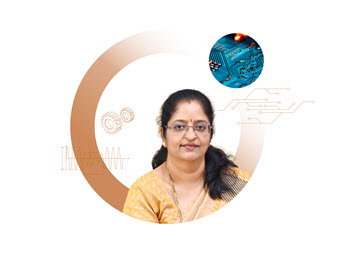
Women who succeed must be recognized and rewarded to inspire others.
Parathodiyil Meena is a professor at the BMS College of Engineering in Bangalore, India. She is head of the Department of Electrical and Electronics, and is passionate about technological innovations that can improve teaching methods.
In 2017, she received the “Outstanding Engineering Teacher Award“, and was honored as Fellow Faculty of Indo Universal Collaboration for Engineering Education.
In her field, women occupy less than 15% of research positions. "For more women to become involved, those who succeed must be recognized and rewarded to inspire others”, so she states.
Dr. Meena especially works on "hybrid reality" applied to the field of teaching - merging the real and virtual worlds, resulting in mixed reality (MR), which allows interaction between physical and digital objects. Supported by La Fondation Dassault Systèmes in India, Dr. Meena led a project consisting in the setup of an interactive and immersive virtual reality platform to train her students more efficiently to different electrical and electronic systems.
These technologies allow students to understand very easily most complex technical lectures. Being able to virtually dismantle and reassemble an object, to test it in complete safety, is an evidence to learning by experience. Not to mention the thrill of a virtual performance!
"To carry out this project, I had to show a lot of perseverance. But I also tried to always maintain a good mood within the team and to stay close to the students, to give them all the help they needed.”
She would like to see both young women and men motivated by these new approaches. "There is still much to be explored to improve systems engineering and design education through new technologies; this should be exciting and captivating for young minds.”
Dr. Sharon DeVivo
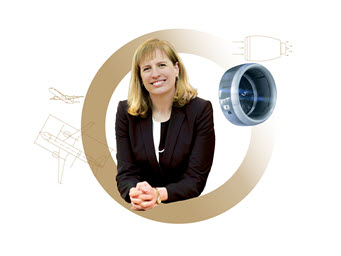
Women have so much to contribute to the next generation of aviation and aerospace endeavors
Dr. Sharon DeVivo is President and Chief Executive Officer of the Vaughn College of Aeronautics and Technology in New York, USA (The Voice of Experience Article). Her educational background and credentials are in communications and higher education management. She came to aviation education 25 years ago when she joined the staff of Vaughn College, an institution dedicated to the fields of aviation, engineering, technology and management. Her career has been committed to serving underrepresented students with a pathway to a lifetime of opportunity.
Dassault Systemes’ US Foundation shares Vaughn’s commitment to bringing aviation education to students at the pre-university level, especially those from underserved populations. The students served by this project in Bronx, NY will be exposed to the exciting fields of aviation and aerospace in a way that we hope will excite them to consider these fields for their long-term professional careers.
Students need to see successful role models in order to consider those fields and careers for themselves. “I hope I provide young women with the inspiration to pursue leadership roles that have an impact”, states Sharon DeVivo.
In her opinion, to bring more women to this industry, we need to think about building awareness at a young age, providing them engaging opportunities throughout secondary school, and a clear pathway to university programs that include internships, mentoring and experiences to inspire them as they pursue their academic credentials. And industry partners need to be welcoming, supportive and committed to women’s success throughout their careers.
“Women have so much to contribute to the next generation of aviation and aerospace endeavors. We need the current leaders of our industries to recognize that the problems we need to solve to advance technologically will only be solved with a diversity of thought—women and other underrepresented groups bring that ability and will take us to the next level”, she concludes.
Dr. Anindita Roy
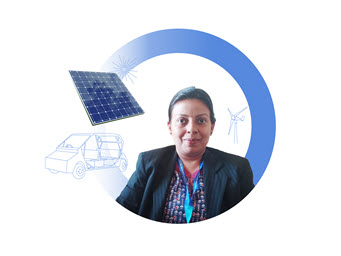
Women in research can act as role models for younger girls
Dr. Anindita Roy is a renewable energy technologist, currently an Associate Professor in Mechanical Engineering Department at Pimpri Chinchwad College of Engineering (PCCoE), Pune, India.
With the support of Dassault Systemes’ Foundation in India, she set up a team of students and professors from PCCoE, the Team Solarium, dedicated to the conception and development of solar-electric vehicles and their charging station (read more on the project).
In this context, the innovating engineer trained her students to design and develop vehicles powered with renewable energies, while further advancing the awareness of the need for innovative sustainable solutions.
Working in the solar vehicle team, Dr. Roy had to face situations that required dealing with conflicting thoughts amongst the team members, as well as taking crucial decisions and bringing them together in order to deliver the vehicle within the given timelines. “This, in essence, stands as a testimony for my ability as a woman leader”, states Dr. Roy. During the project, she was glad to seize many opportunities to re-invent herself also as a team leader.
Anindita Roy strongly believes that “Women in research can act as role models for younger girls”.
And she adds: “Today, women comprise about 15% of the research workforce in science and technology, while 25 % of women follow scientific paths in various institutions or universities. In the future, if women were to play a major role in education and research, young girls should dare to leave the comfort of staying with their parents and integrate prestigious educational institutions in India or even in foreign countries. Later on, support and encouragement to women pursuing higher education such as Masters/ PhD degrees is also crucial, so that they complete their education.”
Isabelle Chèné
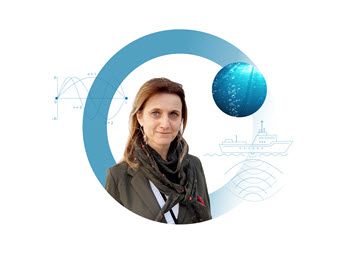
You are legitimate as future scientists!
Isabelle Chèné teaches physics and chemistry at the Collège Romain-Blache, in Saint-Cyr-sur-Mer, Southern France. Her main mission consists of course in passing knowledge, but what makes really sense to her is to guide her students to make them want to explore the world of science and all its possibilities. In that context, she is the referent teacher for a competition called CGénial for middle schools of the Nice area; she is also involved in Mission Océan (https://mission-ocean.org/), an interdisciplinary pedagogical project that combines science, innovation and knowledge of the protection of the oceans.
Even today, women are still a minority in scientific and engineering paths; even though they do rather better than boys do in high school (they represent 57% of general stream graduates). As Isabelle mentions in her classes: "This is not about a lack of taste for science, it is quite easy to arouse the curiosity of girls as well as boys; but it's a question of self-confidence. We have to help them decide to continue studying science. »
Getting out of the classrooms, leveraging curiosity, demonstrating concrete applications in science and related careers to embrace, but also meeting atypical scientists, those who did not necessarily have a clear vocation since childhood: all these elements encourage students to stick to science, while they used to tend to doubt that they were legitimate in this field, especially for girls. At the opposite of what usual stereotypes would lead them to believe, having these students involved in concrete projects help them prove that they can succeed in the fields of science.
As Isabelle encourages young girls, she states: "Be curious, be bold, believe in yourself; you are legitimate as future scientists! Your confidence and your vision of the future will benefit everyone! ».